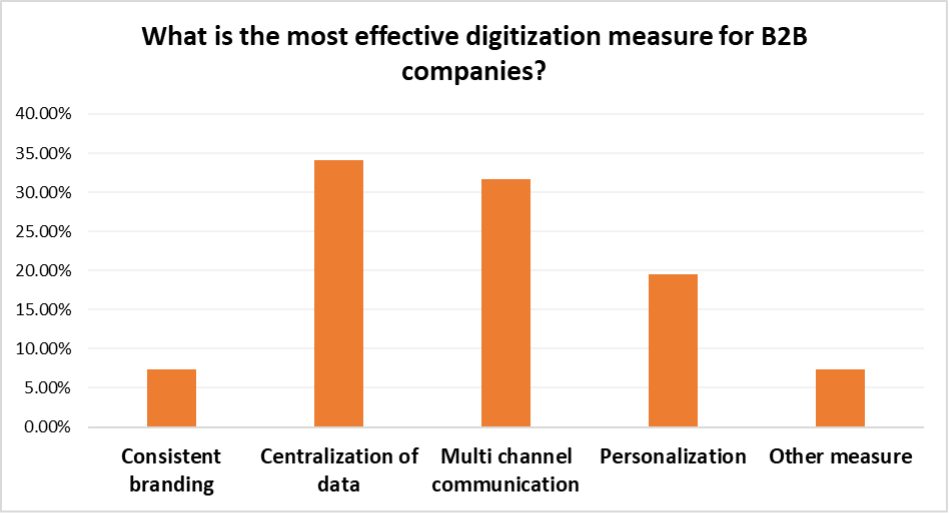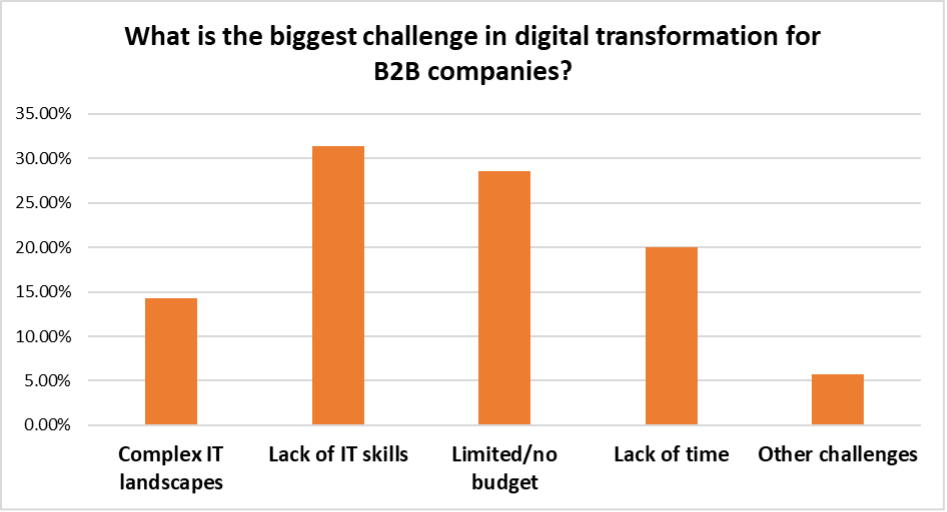Data Centralization and Multichannel the Most Effective Digitalization Measures for B2B Companies

In early March 2023, a joint webinar was held with our partner TOWA on the digital transformation of B2B companies. This webinar, organized by Acquisa, aimed to share feedback to help B2B companies, in particular SMBs, to develop their online sales (+selling).
It was a huge success as more than 250 attendees connected online to follow this webinar. Among the subjects discussed, there was the result of a study on the digital transformation of B2B players carried out by Acquisa, which was made up from the responses of more than 50 B2B companies.
Among the results of this study, there were two which stood out as being particularly important to highlight as they relate to our convictions and to the work carried out by our teams in recent years to make Ibexa DXP, the DXP for B2B players.
What is the most effective digitization measure for B2B companies?
B2B companies continue to invest heavily in the digitalization of their business to catch up and meet the expectations of new buyers influenced by their own B2C purchases.
When B2B companies are asked, "what do you think are the most effective actions in terms of digitalization?" Interestingly, data centralization (34.15%) and multi-channel communication (31.71%) come out on top.
In the world of B2B, too often it is up to the customer to centralize and compile the various information received. Different prices depending on the channel, for example (newsletter, product catalog, e-commerce store, physical store, etc.), which damages the image and professionalism of the seller. These disparate systems must be moulded into a system that functions as a whole. If not, organizations will suffer from data silos, an inability to implement omnichannel practices successfully, resulting in poor user experiences.
At Ibexa, we share this conviction - having essential data in the same place (marketing data; product data including characteristics, stock, price; customer data, etc.) to offer an optimal journey without disrupting the experience. In 2023, we expect DXPs to emerge as the most effective and popular way of bringing all these systems into line and tying everything together.
Finally, we note personalization which came in third place with 19.51%. An increasingly strong awareness of a central subject of the customer experience; and a growing expectation from customers who want to be considered.
The idea that digital transformation is a priority which is primarily driven by customer demand is backed up by statistics. A Digital Commerce 360 survey showed that just under half of B2B suppliers believe developing a more sophisticated website to meet customer needs is the biggest challenge they face in 2022. Likewise, Forbes recently reported in a survey that showed 75% of B2B customers had requested the ability to purchase online. Almost three-quarters of those customers stated that the reason was the simplicity of shopping online. Customer expectations and demands are driving digital transformation in B2B companies and forcing the adoption of new technologies.
What is the biggest challenge in digital transformation for B2B companies?
The second question focuses on the biggest challenges faced by B2B companies in their digital transformation.
As mentioned above, B2B companies are transforming at an unprecedented speed when it comes to digital. However, it is not simple! When asked "What is the biggest challenge in digital transformation for B2B companies?", the overwhelmingly response was "a lack of IT skills" (31.43%) and "limited/no budget" (28.57%).
Not surprising when you consider what digital has become now and the investment needed to catch up and meet the expectations of its new customers. This is a key point that we share at Ibexa, so much so that we have this conviction that our mission is to simplify and help B2B companies go digital.
We firmly believe in the Digital Experience Platform (DXP) approach: having an all-in-one software that facilitates digital transformation by centralizing content, users, and services. All in one yes but modular to support B2B companies step-by-step in their projects whilst controlling their investments. Without a DXP, just imagine the financial investment, the time, and the skills required to integrate a Content Management System (CMS), a Product Information Management (PIM), a Customer Data Platform (CDP), an Online Store... and here we are only talking about a part of digital.
Beyond the increasingly wide scope of digital, we believe that the simplification of digital is essential for it to be accessible to as many people as possible. Indeed, more and more people are involved in digital without being specialists. This is why we have completely redesigned the UX interface of Ibexa DXP for v4. This is also why we continue to invest heavily in our flagship Page Builder feature, which allows you to create attractive pages without technical skills with a simple drag and drop functionality. And finally, that is why we recently launched Ibexa Connect, an iPaaS to manage technical and business integrations without resorting to developments, again using a simple drag and drop.
Regarding the cost of digital transformation (as a reminder, 28.57% said that limited/no budget was their biggest challenge), we are campaigning for a progressive investment, phase-by-phase, as we present it in our methodology for B2B players. It makes no sense to pay a 50K€ annual license fee for a website, but this sum will not remain an obstacle in the long term if the digital channel becomes contributory to the Revenue of the company at the end of a cycle of planned investment. Finally, we firmly believe in Ibexa Connect and the automation of repetitive tasks, which allow economies of scale and free up room to continue to support its digital transformation.
To highlight the importance of the topic, let's share some statistics. At the end of 2022, Harvard Business Review had compiled in an excellent article about the average failure rates of digital transformation projects. Brace yourself, various studies from academics, consultants, and analysts indicate that the rate of digital transformations failing to meet their original objectives ranges from 70% to 95%, with an average at 87.5%. But why? Well, because most companies go too fast and do not consider their digital maturity. Start with step one and invest the focus and resources to get it right: training and skills development are key here.
In conclusion, accelerating your digital transformation means investing in your priorities (step-by-step) while circumventing the difficulties you will encounter. But the solutions exist! In a recent report, McKinsey found that only 20% of B2B buyers want to return to in-person sales; highlighting the change that B2B companies are currently facing and the importance of accelerating their digital transformation!
See what Ibexa DXP can do for you
Watch a product tour of Ibexa DXP and how it can help you tackle digital transformation.
Interested in learning more? Book a personal demo.



